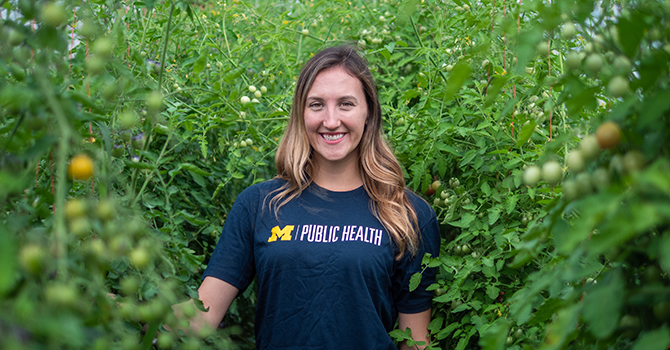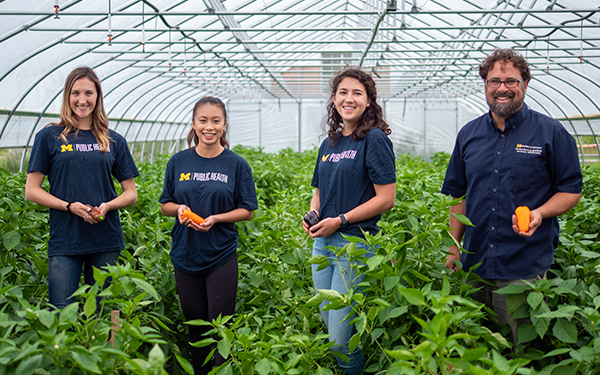Inspired by Adversity to Create Better Health through Food

Brooke Callaghan
Master's Student in Epidemiology, Dow Sustainability Fellow, Gelman Global Scholar, Fedor and Mechthild Medzihradsky Global Intern
When the recession hit in 2007, money for food became very limited for my family. We were forced to rely on food assistance through what’s now called the Supplemental Nutrition Assistance Program (SNAP). The experience made me cognizant of the importance of nutrition and its impact on so many aspects of our lives. Since then, I knew I wanted to do my part in helping to address food insecurity because I believe that everyone deserves access to nutritious and affordable food.
There are few things I see as more fundamental to begin a healthy life as a human being than proper nutrition.
My public health interests expanded while I was an athlete at Michigan, earning a bachelor’s degree in environmental sciences and competing on the track and field team. During that time, I was very focused on the topic of nutrition because of my desire to stay healthy and optimize my athletic performance. At the same time, I was learning about all the intersections between sustainability, health, and equity in my undergraduate program. There was a specific moment when I solidified my decision to pursue public health work: on a service trip to Baja California, Mexico, I saw a newborn being fed Coca-Cola from a baby bottle. There was no direct access to clean water, and since Coca-Cola was less expensive than bottled water, many relied on soda as their main source of hydration. There are few things I see as more fundamental to begin a healthy life as a human being than proper nutrition, so this was a startling circumstance to witness. At that moment, it was clear to me that I wanted to be more involved in helping to reduce the burden of malnutrition on a global level.
From there, I decided there was nothing stopping me from contributing to this kind of work right away. After graduation, I took an internship through the Nature Academy at Matthaei Botanical Gardens and spent the summer working for the Campus Farm. I was able to assist in the organic production of food for the U-M dining halls, planting the first rooftop garden at the Ross School of Business, and maintaining the garden for the Heritage Seeds project with the Anishinaabe Tribal Communities. These hands-on experiences provided me with invaluable lessons related to food production and its connection with human health.
In fall of 2018, I began an MPH in epidemiology. I chose epidemiology as a focus area because of my desire to understand the origins of the health risks associated with malnutrition. I’m eager to contribute research in the investigation of nutrition related-diseases and provide evidence for imperative food policy reform and intervention in many different sectors including agriculture, education, and medicine.
Participating in research like this is one of the ways I am able to contribute to the field of public health and to real communities as I continue to learn.
I was fortunate to have the opportunity to start participating in this research last year as a Research Assistant for Dr. Cindy Leung, helping to collect the data for the Family Food Study. The study investigates the connection between household food insecurity and various physical and psychosocial measures among families. Participating in research like this is one of the ways I am able to contribute to the field of public health and to real communities as I continue to learn. But it’s important to me that my impact doesn’t stop at my own neighborhoods. That’s why I chose to participate in a global internship at the Universidad de Chile in Santiago, Chile this past summer. There, I conducted an analysis of fruit and vegetable intake among the Chileans and adherence to food-based dietary guidelines.

Brooke (left) with colleagues at Michigan's Campus Farm.
As part of my Dow Sustainability Fellowship, I worked on the establishment of the Maize and Blue Cupboard Donation Garden, with the goal of providing a variety of sustainably-grown fruits and vegetables to food insecure students. The garden also serves as an educational platform for sustainability and nutrition and raises awareness of student food insecurity across the community. In addition to gardening opportunities, our work has involved programming for students like cooking classes that help them incorporate local foods into their diets. This semester we are continuing to work with our community partners the Campus Farm, the U-M Sustainable Food Program, and the U-M Student Hunger Initiative to ensure similar programming will be available to students well into the future. Through my Fellowship, I was able to build upon existing efforts to address food insecurity on our own campus with my project partner Dany Zemmel (EHS).
Facing my own family’s struggle with food insecurity as a kid made me conscious of the role of food in my life and the importance of nutrition. I understand first-hand that food insecurity encompasses so much more than hunger. I believe that access to healthy food is a human right, and now I pursue my education in public health in order to contribute to the research, community intervention, and policy change necessary in order to reduce food insecurity and malnutrition in communities most in need.
- Interested in public health? Learn more here.
- Learn more about the Epidemiology program.
- Support research and engaged learning at the School of Public Health.
